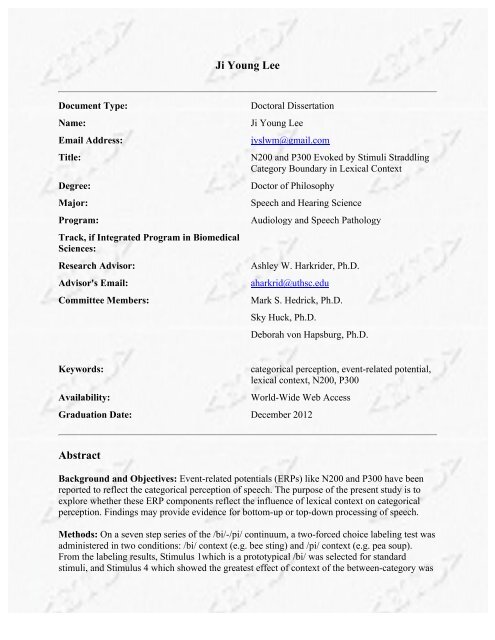Ji Young Lee Abstract - ETD Index Page
Ji Young Lee Abstract - ETD Index Page Ji Young Lee Abstract - ETD Index Page
Ji Young Lee Document Type: Name: Email Address: Title: Degree: Major: Program: Track, if Integrated Program in Biomedical Sciences: Research Advisor: Advisor's Email: Committee Members: Doctoral Dissertation Ji Young Lee jyslwm@gmail.com N200 and P300 Evoked by Stimuli Straddling Category Boundary in Lexical Context Doctor of Philosophy Speech and Hearing Science Audiology and Speech Pathology Ashley W. Harkrider, Ph.D. aharkrid@uthsc.edu Mark S. Hedrick, Ph.D. Sky Huck, Ph.D. Deborah von Hapsburg, Ph.D. Keywords: Availability: categorical perception, event-related potential, lexical context, N200, P300 World-Wide Web Access Graduation Date: December 2012 Abstract Background and Objectives: Event-related potentials (ERPs) like N200 and P300 have been reported to reflect the categorical perception of speech. The purpose of the present study is to explore whether these ERP components reflect the influence of lexical context on categorical perception. Findings may provide evidence for bottom-up or top-down processing of speech. Methods: On a seven step series of the /bi/-/pi/ continuum, a two-forced choice labeling test was administered in two conditions: /bi/ context (e.g. bee sting) and /pi/ context (e.g. pea soup). From the labeling results, Stimulus 1which is a prototypical /bi/ was selected for standard stimuli, and Stimulus 4 which showed the greatest effect of context of the between-category was
<strong>Ji</strong> <strong>Young</strong> <strong>Lee</strong><br />
Document Type:<br />
Name:<br />
Email Address:<br />
Title:<br />
Degree:<br />
Major:<br />
Program:<br />
Track, if Integrated Program in Biomedical<br />
Sciences:<br />
Research Advisor:<br />
Advisor's Email:<br />
Committee Members:<br />
Doctoral Dissertation<br />
<strong>Ji</strong> <strong>Young</strong> <strong>Lee</strong><br />
jyslwm@gmail.com<br />
N200 and P300 Evoked by Stimuli Straddling<br />
Category Boundary in Lexical Context<br />
Doctor of Philosophy<br />
Speech and Hearing Science<br />
Audiology and Speech Pathology<br />
Ashley W. Harkrider, Ph.D.<br />
aharkrid@uthsc.edu<br />
Mark S. Hedrick, Ph.D.<br />
Sky Huck, Ph.D.<br />
Deborah von Hapsburg, Ph.D.<br />
Keywords:<br />
Availability:<br />
categorical perception, event-related potential,<br />
lexical context, N200, P300<br />
World-Wide Web Access<br />
Graduation Date: December 2012<br />
<strong>Abstract</strong><br />
Background and Objectives: Event-related potentials (ERPs) like N200 and P300 have been<br />
reported to reflect the categorical perception of speech. The purpose of the present study is to<br />
explore whether these ERP components reflect the influence of lexical context on categorical<br />
perception. Findings may provide evidence for bottom-up or top-down processing of speech.<br />
Methods: On a seven step series of the /bi/-/pi/ continuum, a two-forced choice labeling test was<br />
administered in two conditions: /bi/ context (e.g. bee sting) and /pi/ context (e.g. pea soup).<br />
From the labeling results, Stimulus 1which is a prototypical /bi/ was selected for standard<br />
stimuli, and Stimulus 4 which showed the greatest effect of context of the between-category was
selected as the deviant in an active oddball paradigm commonly used to obtain N200 and P300<br />
ERPs. After subjects finished a two-forced choice labeling test, they participated in<br />
electrophysiological testing while simultaneously pressing a response button when they heard the<br />
deviant stimuli. A total of 450 stimuli composed of 369 standard stimuli (81%) and 81 deviant<br />
stimuli (19%) were presented in an active oddball paradigm for /bi/ and /pi/ context word<br />
conditions, respectively. ERP responses were measured using 9 electrodes from 21 normal<br />
hearing adults. Electrophysiological data (amplitude and latency of N200 and P300) and<br />
behavioral data (labeling, discrimination response accuracy, discrimination reaction time) were<br />
analyzed.<br />
Results: (1) The amplitude and latency of N200 and P300 did not represent the change in<br />
categorical perception in the presence of lexical context that was demonstrated in the labeling<br />
task, (2) N200 amplitude was the largest over the frontal region while P300 was the largest over<br />
the parietal region, (3) discrimination reaction time was faster in the /pi/ context condition than<br />
/bi/ context condition while response accuracy did not differ with context, and (4) there was no<br />
correlation between N200/P300 and behavioral data.<br />
Conclusion: N200 and P300 do not reflect the lexical effect on pre-lexical processing of<br />
categorical speech stimuli. Findings suggest that lexical context does not affect<br />
electrophysiological measures of pre-lexical speech processing (e.g., N200 or P300), supporting<br />
the autonomous (bottom-up) model that speech perception influenced by lexical context (as<br />
demonstrated behaviorally) occurs on the post-lexical level.<br />
Attached File(s)<br />
pdf (0.5 Mbytes). This pdf best viewed using the latest version of Acrobat Reader. .<br />
| Back to <strong>ETD</strong> <strong>Index</strong> <strong>Page</strong> | Back to CGHS Home <strong>Page</strong> |<br />
Revised 21 March 2013



